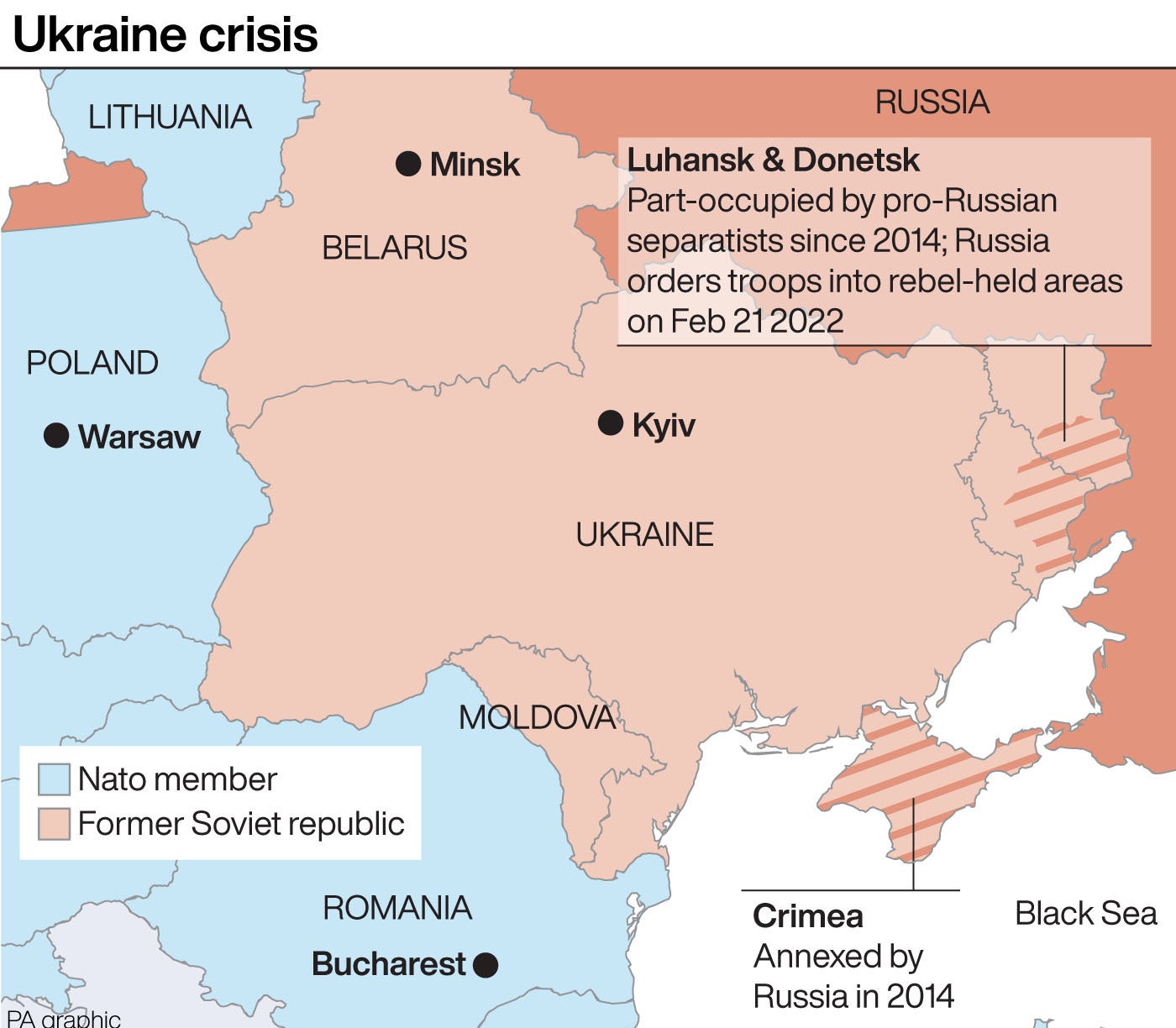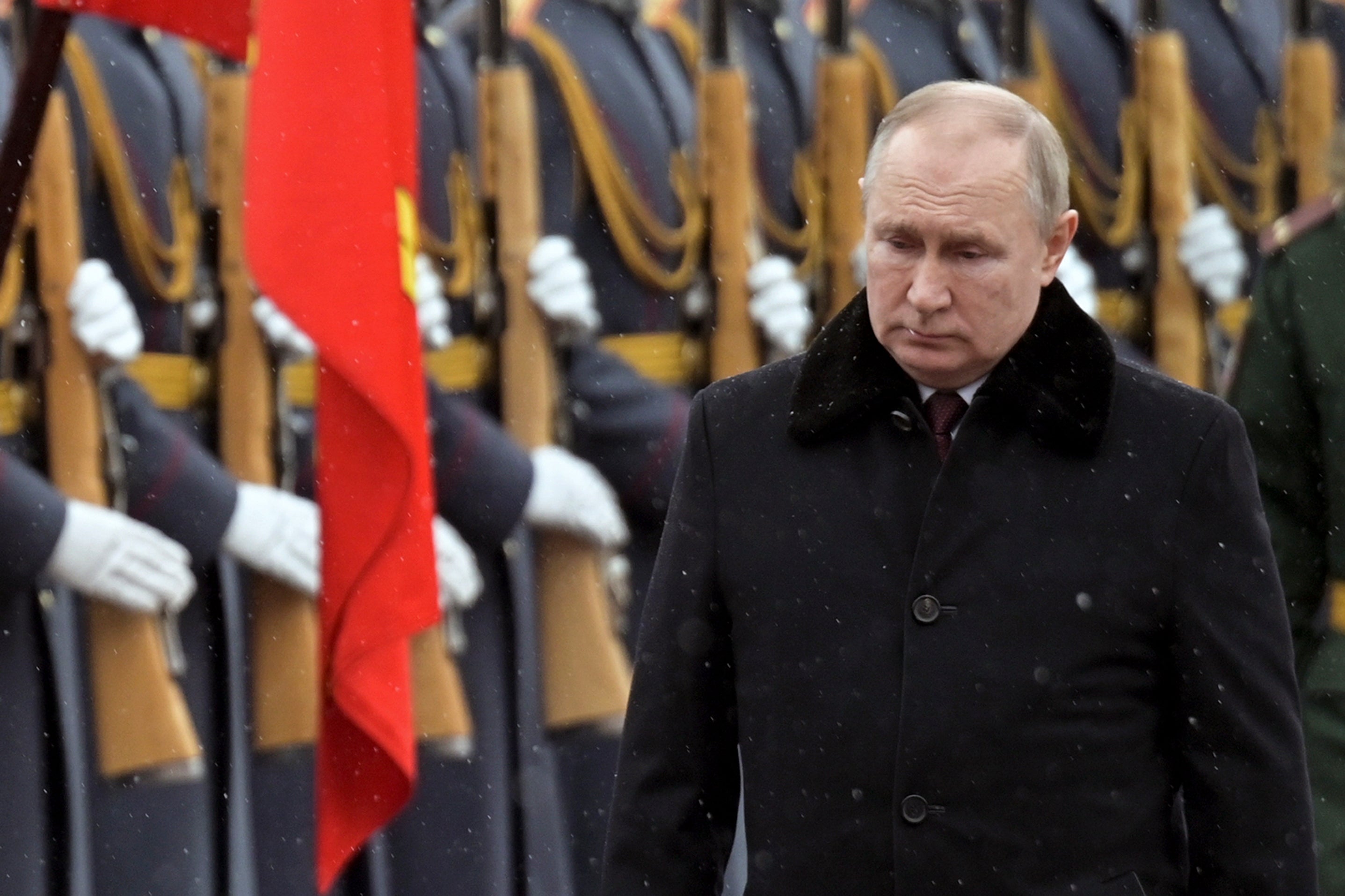Ukraine crisis: Separatists ask for Kremlin’s help as satellite images show new Russian deployments
US defence official warns Moscow’s forces are ‘as ready as they can be’ for an invasion

Your support helps us to tell the story
From reproductive rights to climate change to Big Tech, The Independent is on the ground when the story is developing. Whether it's investigating the financials of Elon Musk's pro-Trump PAC or producing our latest documentary, 'The A Word', which shines a light on the American women fighting for reproductive rights, we know how important it is to parse out the facts from the messaging.
At such a critical moment in US history, we need reporters on the ground. Your donation allows us to keep sending journalists to speak to both sides of the story.
The Independent is trusted by Americans across the entire political spectrum. And unlike many other quality news outlets, we choose not to lock Americans out of our reporting and analysis with paywalls. We believe quality journalism should be available to everyone, paid for by those who can afford it.
Your support makes all the difference.Russia has claimed separatists in the Donbas region have asked for military help to repel “aggression”, as the long-brewing crisis at Ukraine’s border shows signs of coming to a head.
As Kiev’s parliament voted to declare a state of emergency on Wednesday, in the wake of the Kremlin’s incendiary move to recognise parts of eastern Ukraine as independent entities, satellite imagery showed a number of new military deployments in western Russia.
The images released by Maxar Technologies showed military convoys, artillery and armoured personnel carriers, with support equipment and troops, many of them within 10 miles of the border with Ukraine and less than 50 miles from the Ukrainian city of Kharkiv, the private US intelligence firm said.
A senior US defence official in Washington said the Russian forces arrayed along Ukraine’s border are “as ready as they can be” for an invasion, with about 80 per cent in “forward positions, ready to go” within three to 30 miles of the border.

Addressing the UN general assembly in New York on Wednesday, UN secretary general António Guterres, warned the world was facing “a moment of peril” and urged “restraint, reason and de-escalation” to avoid “a scale and severity of need unseen for many years”.
The warnings came after Vladimir Putin signed an on-air decree recognising the two breakaway Donbas regions of Luhansk and Donetsk, throwing a match to previous treaties some western leaders had hoped could pave the road to a diplomatic solution just a day prior.
Justifying the move, the Russian president gave a chilling speech in which he referred to eastern Ukraine as “ancient Russian lands” he claimed were “managed by foreign powers”, and said that “the responsibility for the possible continuation of the bloodbath will be on the conscience of the regime that is ruling in Kiev”.
Shelling has continued to intensify along the long-simmering front line of tensions in Donbas, following weeks of warnings from Washington that Mr Putin could seek to use “false-flag” violence in the region as a pretext to invade.

While Russia has consistently denied it plans to invade its neighbour, that pretext appeared to solidify on Wednesday, as Russian news agencies reported Kremlin officials as saying the leaders of the two breakaway areas had sent Mr Putin “a request to provide help to repel aggression from the armed forces of Ukraine”.
“I am asking for help to repel the Ukrainian regime's military aggression against the population of the Donetsk People's Republic,” Denis Pushilin, who heads one of the regions now recognised as independent by Moscow, was reported as saying.
Mr Pushilin earlier told a news conference that he favoured dialogue with Ukraine, but said the situation had become critical and that the separatists had accelerated a mobilisation of forces, in which healthy men between 18 and 55 have been called up to fight.
“With people like this, we will win. With such a country, with big Russia, which we respect and value,” Mr Pushilin said. “We have no right to lose, or even to doubt in our victory.”

The request came hours after Mr Putin sanctioned the deployment of troops to the rebel territories to help “maintain peace”, with the Kremlin granting him permission to use military force outside of Russia.
As diplomatic hopes of averting a war appeared to fade, Ukraine urged its citizens to immediately leave Russia, while Moscow began evacuating its embassy in Kiev. By Wednesday afternoon, the Russian flag no longer flew over the building.
Hours earlier, Ukraine's national security and defence council chief, Oleksiy Danilov, declared a national state of emergency, which according to a draft text restricts the freedom of movement of conscripted reservists, curbs the media and imposes personal document checks.
The measure was approved by Kiev’s parliament, in addition to a law allowing citizens to bear firearms.
Volodymyr Zelensky, Ukraine’s president, has also called up reservists to the country’s army, and said on Wednesday: “Predicting what might be the next step of Russia, the separatists or the personal decisions of the Russian president – I cannot say.”
In an emotional address late on Wednesday, Mr Zelensky said in Russian that while “the people of Ukraine and the government of Ukraine want peace”, if the nation comes under an attack, “we will fight back”.
Meanwhile, Britain, the US and EU continued in their attempts to heap pressure on Moscow.
With Germany’s Olaf Scholz having moved to shut down the multibillion-pound Nord Stream 2 gas pipeline, in addition to sanctions by Washington, London and Brussels, the rouble plunged around three per cent on Wednesday.
But Boris Johnson – whose current sanctions target three oligarchs linked to the Kremlin and five smaller Russian banks – faced criticism, with Labour leader Sir Keir Starmer warning that the limited sanctions announced so far could “send the wrong message” to Mr Putin.
Announcing a new package of support for the Ukrainian military, which “will include lethal aid in the form of defensive weapons and non-lethal aid”, the prime minister touted a new wave of measures to “stop all Russian banks, all oligarchs, all Russian individuals, raising money on London markets”.
“What we want to see is de-escalation by Vladimir Putin,” Mr Johnson said. “There is still hope that he will see sense, but we are ready very rapidly to escalate our sanctions.”
Additional reporting by agencies


Join our commenting forum
Join thought-provoking conversations, follow other Independent readers and see their replies
Comments